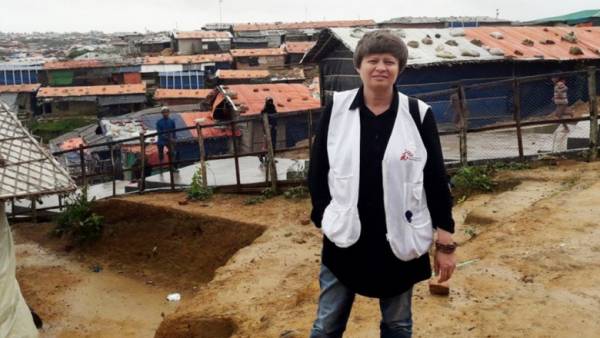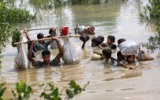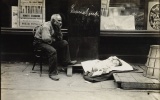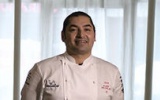“It’s important for me to be where the war”. The coordinator of “Doctors without borders” — about the rescue of refugees and its work
A year ago, at the end of August 2017, tens of thousands of Muslim Rohingya have fled Myanmar to Bangladesh to escape the ethnic cleansing.
Upstairs
Russian service Bi-bi-si recorded the story of the employees of “Doctors without borders” Tatiana Kotova about how now looks like a refugee camp, Rohingya people how the life and work of humanitarian organizations and why the principle of fairness has to be observed even during the matches of the world Cup.
News Who are the Rohingya and what is happening to Muslims in Myanmar?
Who are the Rohingya and what is happening to Muslims in Myanmar?
“Right now I’m sitting on the shore of the Bay of Bengal, near the city of Cox’s Bazar in Bangladesh. I have the first in almost three months off. Cox’s Bazar has become a famous recent months due to the influx of refugees from Myanmar. Refugee camp Kutupalong where I work in the mission “Doctors without borders”, is here about 25 kilometers.
Camp
Let’s start with camps. It is the largest to date, the refugee camp of Muslim Rohingya. A year ago, it was the usual hills and jungle, traditional for these places; there were wild elephants. The camp was formed spontaneously — if you remember the beginning of the crisis in August 2017, in Bangladesh began to arrive about ten thousand people a day crossing the border, which is very close. People were building primitive shelters, then joined humanitarian organizations, the government, which actually opened the border for these refugees.
Now this is a very densely populated area, this combination of traditional buildings — I don’t even call it houses of bamboo and local clay, and plastic materials that provide humanitarian organizations for the construction of temporary shelters.
All very tight and now live about 700 thousand people. This, for example, considerably more than the whole population of Helsinki.
With the important caveat that the Finnish vastness is incomparable with the size of our camp: there are areas where one person has from one to five square meters — total area including all the rivers and the hills, bridges, roads and other non-residential space. There is a road which can be reached by car, but basically you have to walk to cross the river, canals, climb hills.

Conditions decent. Of course, when I say “decent conditions”, I’m out of their humanitarian indicators assume: that is, we are not talking about a soul or about a normal school we are talking about the fact that the situation is somehow under control. There is access to clean water, no hunger, no epidemics. Quite a lot of medical organizations which try basic assistance to provide. We, in particular, are basic vaccines to control the spread of dangerous diseases.
World organization for the provision of food regularly tries to take the food, but the food is very basic: rice, oil, beans. That is, people do not die, but, of course, is far from the conditions of human dignity.
The situation is changing literally within two hours, when it starts raining. Now the monsoon season, clay is eroded and the movement of any kind becomes very difficult. Many families have lost their homes due to mudslides and local flooding.

The Rohingya problem is that they don’t even have refugee status. There is a term special, quite tricky, “internally displaced residents of Myanmar”, but the official UN refugee status they have.
And so, for example, no right to work officially.
Organisations are trying to provide schools, but, again, the illegal school, just as employment resource centers for children. We are trying people involved in the work, but we can only do this on a volunteer basis, but among them, a lot of people could work. Now the camp has its own markets, its some classes, children play — life always prevails, but it is sad that people could benefit themselves and each other, but there is no legal framework for this.
Hospital
Hospital we have pretty decent by local standards. About 110 beds, and has outpatient and inpatient departments, including malnourished children, emergency Department. We have more than a hundred calls daily, in a month there are about twenty thousand consultations.

The uniqueness of our hospital that it is on the border between the camp refugees and the local community, i.e. the main population of the city. We both accept, and they are, in General, our services are willing to use. We have three health centres, they are located directly at the camp on a good place, that people were comfortable coming back. The sites are open only during the day — there is advice on pregnancy, after childbirth, there is a small clinic, where the doctors diagnose, prescribe medication or send them to our clinic if the case is serious enough.
News Unique photos which saved the lives of many children in America
Unique photos which saved the lives of many children in America
I am the coordinator of the whole project. My goal is to build everything, the machine worked well and did not allow failure. Starting with security and ending with the creation of living conditions that employees had the opportunity to relax, the food was decent. In the state there are, of course, and the professional financiers, and logistics, my role is overall coordination. After all, if underlying mechanisms are not working, it is difficult to carry out our primary task, that is, in fact, to provide medical services.
Life
I Wake up around six in the morning, somewhere in seven starts checking the news if there are any incidents in terms of security. And here a very important factor — the weather. Every morning we start with the weather: how strong is the rain, and that we can plan. At half past seven I go into the office, sometimes in the hospital or the camp, depending on which program for the day.

Then a lot of meetings. A very large part of the work — negotiations with local authorities and, often, the police and the army. I explain what we do and why we need access to the population, so we could move freely inside the camp and outside. There are meetings with staff: we sum up the results, plan together, discuss problems. They give me tasks that they need to work properly, and with this list I’m seeing either with the authorities or with the community or with the medical officials to ask for support or explain any conflict situation.
Do me during missions to see the country is, in fact, painful question. We go to places where not very ratesdirect.
If India, for example, then Yes, it is possible to travel, but if Nigeria, then no, because it is a conflict zone and moved there strictly from home to work. Humanitarian travel, they are, in General, not for tourism.
In Bangladesh we do not live by the most primitive standards: we are not the worst in town house shower, though not hot, and good food by local standards. For example, my mission in Nigeria — it was a tent, electricity and bucket shower for eight months because the city where we worked, was destroyed in the military conflict, and there we built the first primitive hospital has got its own infrastructure.
News the Former Paris homeless received a star “Michelin”
the Former Paris homeless received a star “Michelin”
Usually my standard contract is six months, then I take a couple of months and then go somewhere else. Until November of 2018 I’m in Bangladesh and there will be seen.
Career
There are many professions that are associated with stress and risk, but people nevertheless choose to become police officers, soldiers or military doctors. Personally, I just need to be where the war — in the broadest sense of the word. But not on the side of those who shoot and those who save.